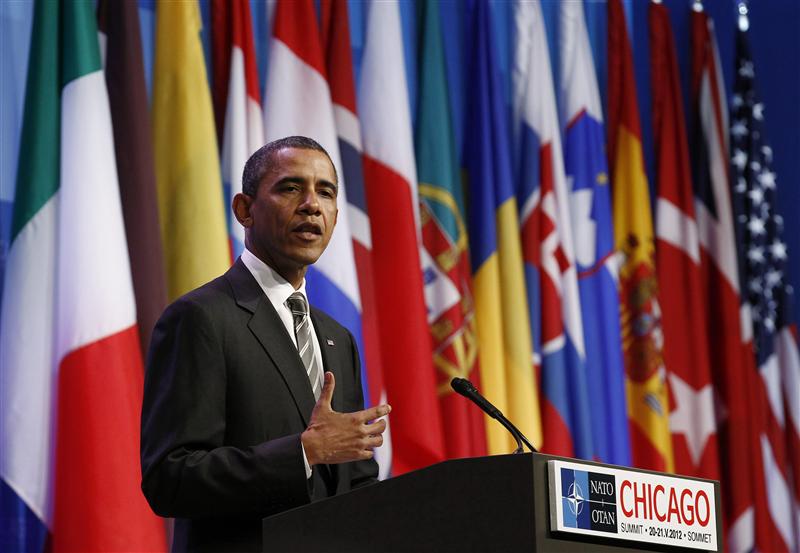As measured from President Obama’s re-election campaign perspective – the White House’s litmus test for foreign policy issues through November – last weekend’s G-8 and NATO Summits were bell ringers. Obama campaign strategists couldn’t have scripted their outcomes better – perhaps because they did script them.
Given the potential for dissent, President Obama could be satisfied that his guests adhered (mostly) to the desired story line. At Camp David, President Obama was the jobs-and-growth champion. In hometown Chicago, with leaders of some 60 countries arrayed around him, he was the president who would wind down an unpopular war. (That his Chicago White Sox trounced the Cubs during NATO Night at Wrigley Field, in a game that opened with an honor guard carrying flags from the 50 countries engaged in Afghanistan, was an added benefit.)
The only problem with this pretty picture is that getting the campaign message right is a long way from getting the world right. What really connected the G-8 and NATO meetings was a growing realization that the biggest threat to the alliance – and, for that matter, to Obama’s re-election hopes – is the euro zone crisis. That risk comes at a time when U.S. debt and political dysfunction makes the West far less resilient. So for all the talk in Chicago about common purpose in Afghanistan, NATO’s most existential danger now comes from within, and its root causes are economic.
When NATO strategists weigh the many threats facing them, they tend to focus first on their founding treaty’s Article 5, which requires all members to defend a single ally against an external security threat. Insiders also often discuss Article 4, which allows for a member country like Turkey to seek urgent alliance consultations when it foresees new dangers, as was the case during the Iraq war and is now again the case concerning Syria.
Yet it’s time for NATO to dust off its long-forgotten Article 2, known at the treaty’s writing in 1949 as “the Canadian article,” because of that ally’s early insistence that military strength couldn’t be separated from economic health. It committed all NATO members to “strengthening their free institutions” and “promoting conditions of stability and well-being. They will seek to eliminate conflict in their international economic policies and will encourage economic collaboration between any and all of them.”
That article was put forward by then-Canadian Foreign Minister Lester Pearson, and was enthusiastically supported by the U.S., because both countries feared NATO would become too much of a military assistance program without sufficient economic cooperation or benefit. Under the logic of Article 2, ambitious free trade and investment agreements – of the sort the Obama administration is currently postponing with Europe – are as strategically important as defense programs.
Some have argued that NATO need not consider such matters, since they have become the domain of the European Union. Indeed, as part of NATO’s recent reforms, it got rid of its economic directorate altogether. Yet now that the EU itself is under threat, it’s time for the alliance to consider the security implications of financial and economic shifts – and how they could alter the strategic balance of power.
According to Article 2, it is also a NATO matter whether Greece leaves the euro zone, given its European, transatlantic and global repercussions. How France and Germany settle their dispute over the policies of growth versus austerity, again, is an issue of deepest concern to the alliance. The growing divide that the euro crisis is creating between the north and south of Europe has significant implications for the future solidarity of NATO members that goes far beyond, but also includes, the sharp decline of defense budgets.
The wider implications of the euro crisis go right to the heart of the geopolitical and security issues that concern NATO. The problems stem both from the European Union’s flagging energy for external engagement and its eroding attractiveness to the outside world as the model of prosperity and stability – to be emulated and, when possible, joined.
A weak, introverted Europe and a debt-laden and distracted United States are encouraging Russia to reassert its influence, in part through its new Eurasian Union, which would be far less attractive were it not for the EU’s troubles. In the Balkans, recent Serbian elections that favored a more nationalist candidate, who represents an anti-EU party, were influenced by the euro crisis. Across the Middle East and North Africa, a battle for hearts and minds is under way: Less attractive influences emerge when the U.S. and Europe are no-shows.
“As more crises may develop, the danger is that we will be so introspective we won’t address them,” says Michael Clarke, director general of the Royal United Services Institute in London. “Europe is losing the ability to be an actor even in its own continent, let alone in world politics.”
NATO leaders can rightly congratulate themselves for coming away from Chicago with a good amount of agreement on the three major agenda items: ending combat engagement in Afghanistan by 2014, pooling more defense capabilities in the face of austerity, and deepening relationships with their most capable partners.
Yet they didn’t begin to address this far more fundamental threat. It’s time for the North Atlantic Council of allied leaders to convene, as provided for under Article 2, to address economic issues that have become matters of strategic consequence.
Fred Kempe is the president and CEO of the Atlantic Council. This blog series was originally published by Reuters.
Image: reuters%205%2027%2012%20Obama%20Chicago_0.jpg
